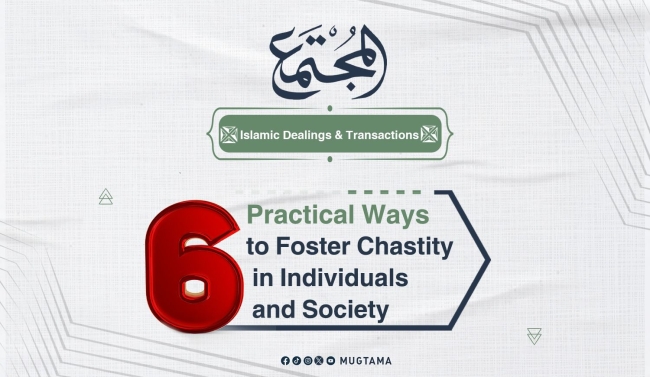6 Practical Ways to Foster Chastity in Individuals and Society
Chastity is a noble virtue that Islamic Sharia has always emphasized for both individuals and society. This emphasis ensures that individuals can live securely without disturbances and calamities, and that the Muslim community can also exist in peace and tranquility, free from the ethical issues that may arise from straying away from this virtuous conduct.
Hence, the importance of understanding the Prophet Muhammad's (peace be upon him) saying: “I have only been sent to perfect noble character,” becomes clear. The Prophet, as an exemplary role model, is the ideal figure that the entire Ummah, both individuals and communities, should follow and immitate. From this standpoint, chastity as an Islamic virtue, when practiced, provides the Muslim with tranquility within his home and family, not to mention the societal benefits that arise from the widespread practice of chastity among its members and acting according to its requirements in their daily lives.
Given the good and beneficial outcomes of chastity, we wish to take a careful pause to elucidate the importance of chastity and its impact on our communities, which have begun to witness the spread of Western behaviors and ethical problems in this era of openness to everything new without placing limits or restrictions. Therefore, it is essential to clarify the means that help us embody the virtue of chastity correctly as our noble religion commands. Some of these means that reinforce chastity in the hearts of individuals and communities are as follows:
- Faith and the Consciousness of Allah:
One of the strongest aids for an individual to maintain chastity is being aware that Allah is ever watching, fearing to be seen by Him in a state of disobedience, and believing in Allah's attributes and His perfection, knowing that nothing is hidden from Him. Allah says, “He knows that which deceives the eyes and what the breasts conceal.” (Ghafir: 19)
- Enhancing Personal Awareness:
This can be achieved by reading the stories of the righteous, especially those that depict examples of the pious Salaf dealing with temptations and their adherence to the value of chastity, avoiding places of temptation and bad company.
- Mosques and Religious Lessons:
Mosques and religious lessons play a significant role in guiding youth towards the importance of chastity and adherence to Islamic manners through sermons and lessons that remind them of the forgotten meanings due to daily life preoccupations, such as the importance of self-discipline and avoiding temptations and desires.
- Family Awareness:
The family is the foundation of upbringing and purification. Therefore, educators must focus on the meanings of chastity and adherence to Islamic commands. Parents should strive to be role models in their commitment to these means so that their children can see them embodied before their eyes. Many behavioral deviations in our societies have an evident cause, which is the neglect of parents in embodying chastity in themselves, let alone teaching it to their children.
- Attention to Schools and Education:
Particularly in teaching the young generation the value of time and utilizing it in beneficial ways, emphasizing engagement in significant matters and avoiding trivialities, self-monitoring by refining the prevalent materialistic and consumeristic tendencies, and not following what is popular or demanded by the masses.
- Community Monitoring:
This is represented by maintaining the practice of enjoining good and forbidding evil, which is the secret of the Muslim community's excellence. Allah the Almighty says, “You are the best nation produced [as an example] for mankind. You enjoin what is right and forbid what is wrong and believe in Allah.” (Aal Imran: 110) This includes media monitoring of what promotes behavioral deviations or ideas contrary to Islamic ethics and manners, and organizing awareness courses for youth about the dangers of moral decay.
-------------------------------------------------------------


